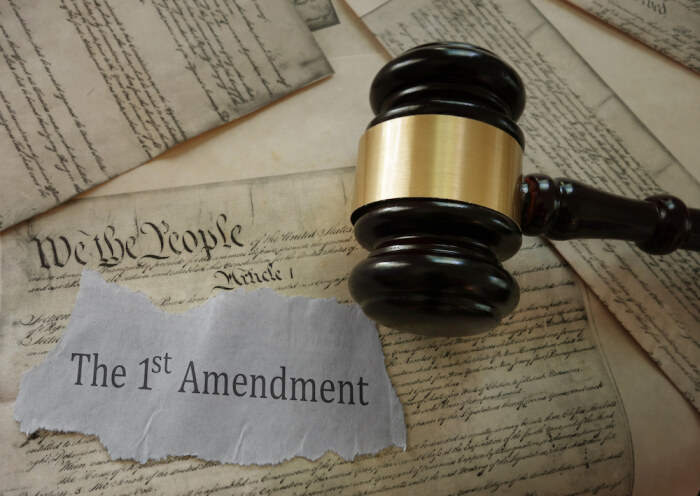UPDATE: Although an Iowa Senate Judiciary subcommittee recommended passage of this bill, the full Judiciary Committee did not take it up before the legislature’s second “funnel” deadline on March 31. That means the bill won’t advance this year. Original post follows.
Iowa House members voted overwhelmingly on February 9 to make it easier to counter lawsuits filed in order to chill speech.
House File 177 would create a path for expedited dismissal of meritless claims stemming from exercise of the constitutionally-protected “right of freedom of speech or of the press, the right to assemble or petition, or the right of association […] on a matter of public concern.” Such cases are sometimes called “strategic lawsuits against public participation” (SLAPP), because the plaintiffs’ goal may be primarily to discourage speech or media coverage, rather than to prevail in court.
The Republican floor manager, State Representative Steven Holt, said passing an anti-SLAPP law became a priority for him after the Carroll Times Herald was sued over coverage of a local police officer who had relationships with teenage girls. Holt noted that even though the libel lawsuit was not successful, the newspaper “was left with over $100,000 in debt and nearly went out of business.”
Holt said the bill was about “protecting our small-town newspapers and media outlets.” Democratic State Representative Megan Srinivas also spoke in favor of the bill, saying it was critical to protect journalists, especially those working in small communities.
More than 30 states have enacted anti-SLAPP statutes. Iowa was among the states that received an “F” on a report card about this issue, which the Institute for Free Speech published in February 2022.
Iowa’s bill adheres closely to model legislation drafted by the Uniform Law Commission. Under certain conditions, parties sued for defamation would find it easier to get the case dismissed quickly and recover court costs and attorneys’ fees.
Institute for Free Speech president David Keating told Bleeding Heartland that if House File 177 is enacted, “Iowa would leap from last to best in the nation at preventing frivolous lawsuits from threatening free speech.”
In his closing remarks on February 9, Holt thanked Professor David Walker, who chairs the Iowa Commission on Uniform State Laws, for his work on the bill over the years. He noted that former Attorney General Tom Miller (a Democrat) had worked with him on previous versions of this legislation, and also thanked current Attorney General Brenna Bird (a Republican) “for her counsel.”
House members approved the bill by 94 votes to 1, with Republican Mark Cisneros casting the only no vote.
The bill now goes to the Iowa Senate, where similar legislation died in committee in 2021 and 2022, despite unanimous approval in the House.
It’s not clear why anti-SLAPP legislation has stalled in the state Senate. The lobbyist declarations for the previous bill show a large and ideologically diverse coalition supported the proposal, while no entity was registered against it. The same is true for House File 177 this year.
When a bill clears one chamber of the Iowa legislature unanimously but fails in the other without any public opposition, one influential lawmaker is often the impediment. Readers with tips on who may have blocked anti-SLAPP bills in the Iowa Senate are encouraged to contact Laura Belin confidentially.
LATE UPDATE: William Morris reported for the Des Moines Register in July 2022 that Republican State Senator Brad Zaun, the Judiciary Committee chair, expressed support for the legislation.
But committee Vice Chair Sen. Julian Garrett, R-Indianola, one of those who objected, described fundamental disagreements with the bill. A law permitting judges to make factual determinations and dismiss cases early runs afoul of the state constitution, he said.
Garrett said he couldn’t support the law “if you’re going to disallow a person’s right to trial by jury,” he said in an interview. “That’s in the constitution. That’s not something the Legislature can just circumvent.”
The Iowa Senate again took no action on House File 177 during the 2024 legislative session, which means supporters will need to start from scratch in 2025.
First Amendment graphic by zimmytws available via Shutterstock.

